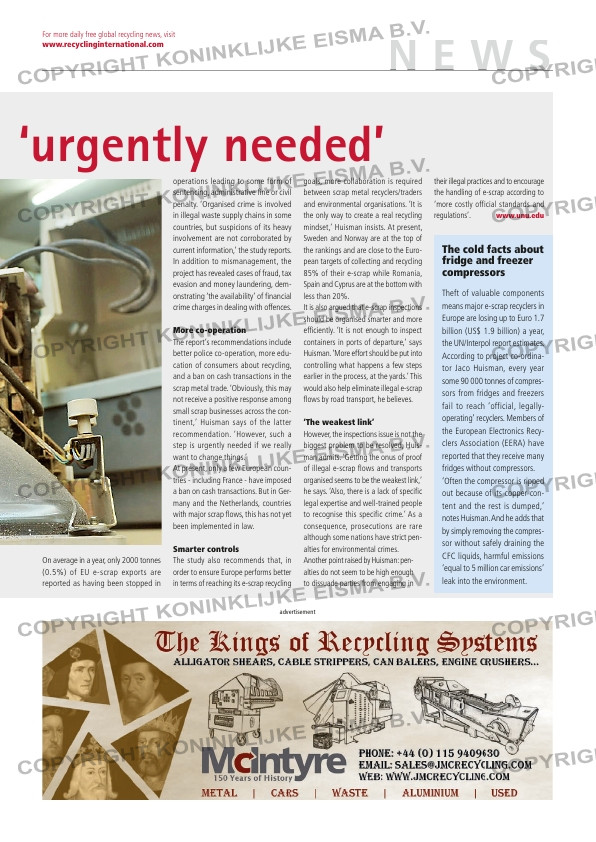Page 7 from: September 2015

N E W S
For more daily free global recycling news, visit
www.recyclinginternational.com
Ban on cash transactions ‘urgently needed’
UN report: millions of tonnes of e-scrap illegally traded within Europe
On average in a year, only 2000 tonnes
(0.5%) of EU e-scrap exports are
reported as having been stopped in
operations leading to some form of
sentencing, administrative fi ne or civil
penalty. ‘Organised crime is involved
in illegal waste supply chains in some
countries, but suspicions of its heavy
involvement are not corroborated by
current information,’ the study reports.
In addition to mismanagement, the
project has revealed cases of fraud, tax
evasion and money laundering, dem-
onstrating ‘the availability’ of fi nancial
crime charges in dealing with offences.
More co-operation
The report’s recommendations include
better police co-operation, more edu-
cation of consumers about recycling,
and a ban on cash transactions in the
scrap metal trade. ‘Obviously, this may
not receive a positive response among
small scrap businesses across the con-
tinent,’ Huisman says of the latter
recommendation. ‘However, such a
step is urgently needed if we really
want to change things.’
At present, only a few European coun-
tries – including France – have imposed
a ban on cash transactions. But in Ger-
many and the Netherlands, countries
with major scrap fl ows, this has not yet
been implemented in law.
Smarter controls
The study also recommends that, in
order to ensure Europe performs better
in terms of reaching its e-scrap recycling
goals, more collaboration is required
between scrap metal recyclers/traders
and environmental organisations. ‘It is
the only way to create a real recycling
mindset,’ Huisman insists. At present,
Sweden and Norway are at the top of
the rankings and are close to the Euro-
pean targets of collecting and recycling
85% of their e-scrap while Romania,
Spain and Cyprus are at the bottom with
less than 20%.
It is also argued that e-scrap inspections
should be organised smarter and more
effi ciently. ‘It is not enough to inspect
containers in ports of departure,’ says
Huisman. ‘More effort should be put into
controlling what happens a few steps
earlier in the process, at the yards.’ This
would also help eliminate illegal e-scrap
fl ows by road transport, he believes.
‘The weakest link’
However, the inspections issue is not the
biggest problem to be resolved, Huis-
man admits. ‘Getting the onus of proof
of illegal e-scrap fl ows and transports
organised seems to be the weakest link,’
he says. ‘Also, there is a lack of specifi c
legal expertise and well-trained people
to recognise this specifi c crime.’ As a
consequence, prosecutions are rare
although some nations have strict pen-
alties for environmental crimes.
Another point raised by Huisman: pen-
alties do not seem to be high enough
to dissuade parties from engaging in
their illegal practices and to encourage
the handling of e-scrap according to
‘more costly official standards and
regulations’. www.unu.edu
Theft of valuable components
means major e-scrap recyclers in
Europe are losing up to Euro 1.7
billion (US$ 1.9 billion) a year,
the UN/Interpol report estimates.
According to project co-ordina-
tor Jaco Huisman, every year
some 90 000 tonnes of compres-
sors from fridges and freezers
fail to reach ‘official, legally-
operating’ recyclers. Members of
the European Electronics Recy-
clers Association (EERA) have
reported that they receive many
fridges without compressors.
‘Often the compressor is ripped
out because of its copper con-
tent and the rest is dumped,’
notes Huisman. And he adds that
by simply removing the compres-
sor without safely draining the
CFC liquids, harmful emissions
‘equal to 5 million car emissions’
leak into the environment.
The cold facts about
fridge and freezer
compressors
advertisement
RI-7 p00_NEWS.indd 7 07-09-15 10:02



